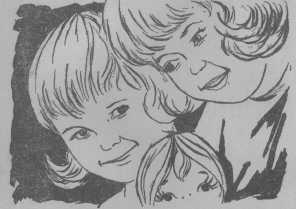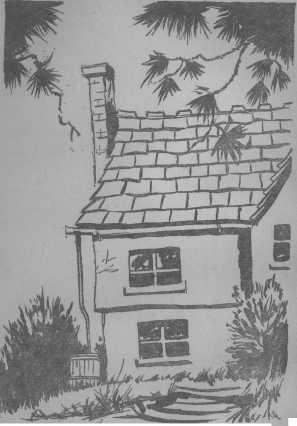Anytime Tales (3 page)

“You can’t! It’s inside me,” said Queenie. But the old woman only laughed and clapped Queenie so hard on the back that her heart flew out of her body, and landed on the grass beside the old woman. It was the queerest thing you ever saw! The old lady bent down and picked up the heart. She shook her head solemnly, and showed it to Queenie’s surprised mother.
“Look there! Her heart is of stone! Feel it—it’s hard and cold. Do you wonder the child can’t feel sorry for anyone, and can’t do a kindness? Who could, with a cold, hard, stony heart like that! It’s the worst heart I have ever seen in my life, and I’ve looked into a good many. Here you are—take it back, little girl. You’ll never be happy till you melt that stony heart of yours.”
“But how can she?” asked the mother, frightened and sad.
“Only one way,” said the old woman, hobbling off. “Only one way. Be kind, even if you don’t feel like it. There’s nothing like kindness to melt a heart of stone!”
“Oh, Queenie, you must try and do what the old woman says,” said her mother. “I do want people to love you, as they love other children. Please will you try to be kind, and see if your heart gets better?”
“Well, I’ll try,” said Queenie, thinking the whole thing was a fuss and a bother. “I really will try. I didn’t very much like the look of my heart, I must say. You know, Mother, it has felt very heavy lately; and, of course, if it’s made of stone that’s the reason!”
Well, you have no idea how hard it is to be kind if you don’t feel as if you want to be! Poor Queenie—it was difficult for her to say nice things to people, and
to try and comfort them when things went wrong. But because she didn’t want her heart to feel heavier and heavier she tried.
“When children fall down I must pick them up,” she planned. “When they get into trouble over their lessons I must help them. When Mother has a headache I must be quiet. It’s easy enough for the other children to do these things, because they
want
to do them—but I don’t. Still I will.”
So she did. She had plenty of chances for kindness that week. Joan, who lived opposite, broke her leg and Queenie went across to see her. She took her one of her own dolls, and she read to Joan for half an hour from a book. She didn’t want to one bit, of course. It bored her very much.
At the end of her visit, when she rose to go, Joan pulled her down to the couch and kissed her. “I never knew you could be so sweet and kind, Queenie!” she

said. “I
love
the doll—and you do read so nicely. Please come again!”
Queenie suddenly felt a curious pain in her heart, and she put her hand there. She felt pleased with Joan’s words, but she wished her heart wouldn’t hurt her so much. It would be too bad if it began to pain her just as she was trying hard to cure it.
The next day she went to see her granny, and she rode in the bus. It was very full, and Queenie could only just find herself a seat. As she sat down she noticed an old man getting on the bus. There was no room for him at all. He would have to stand.
Queenie would have let him stand in the ordinary way, but now she was trying to remember to be kind. So up she got at once.

“Please have my seat,” she said; and the old fellow sat down.
“Now there’s a kind little girl for you!” he said in such a loud voice that everyone heard. They stared at Queenie, and gave her warm smiles. She felt that funny pain round her heart again, and pressed it hard. Oh dear, it really did hurt!
She went into her granny’s house. “How is your poor leg, Granny?” she said. “Don’t get up to get tea. I will get it for you, and I’ll make you some toast, too.”
Queenie had planned all this on the bus. Her granny was most astonished. She sat and watched the little girl getting tea.
“Well, you always were a pretty child, Queenie,” she said at last, “but now you’ve a bit of kindness in your eyes, you look a real darling. It’s a pleasure to have you with me!”
Queenie’s heart hurt her again, but she didn’t say a word. No—she had always boasted that she never felt sorry for herself, so she wouldn’t complaint
A week or two went by. Queenie did every little kindness she could. She gave the old blind man a whole sixpence instead of buying a new chair for her dolls’ house. She took Mrs. Brown’s baby out in the pram for her each day, because Mrs. Brown was so busy with the spring-cleaning. She brought in a poor, half-starved little cat, and asked her mother if she could feed it and keep it for her own. It was the first time she had ever wanted a pet!
She began to look happy, though her heart gave her a lot of pain. She smiled a score of times in an hour.
She laughed more than she had ever done. Her eyes were bright and shone with a kindness that no one had ever seen there before.
“Queenie, I can’t help feeling proud of you,” said her mother. “You really do try very hard indeed to be kind. Do you still find it very difficult?”
Queenie thought hard, and a surprised look came into her eyes. “No,” she said. “It isn’t hard at all now. I don’t have to
try
to be kind. Mother. I want to be. I can’t help being. I don’t have to think to myself, ‘Look, Katie has fallen down. It’s your duty to go and help her.’ I just rush to her without thinking, because I can’t bear to see her crying.”
“I’m so glad,” said her mother. “Your heart must be quite better now.”
“Oh, Mother—it isn’t,” said poor Queenie, pressing her hand to it. “It’s much worse. It gives me such a lot of pain. Sometimes I can’t bear it.”
“Poor child!” said her mother, in alarm. “We’ll go at once to that old woman who lives in the wood. Maybe she can do something. We’ll go now.”
So they went, and came to the old dame’s little hidden-away cottage. She was in, and very pleased to see them.
“Queenie really has been trying to be kind,” explained the little girl’s mother. “But I’m afraid her heart is worse. It hurts her very much.”
“Let’s feel it,” said the old woman, and she put her hand inside Queenie’s frock. She felt round about where her heart was. Then she laughed and laughed.
“There’s nothing wrong!” she said. “Nothing at all!

It’s a different heart entirely! It’s warm and soft—you feel it yourself, madam! Nothing like the hard, cold heart of stone she had before. It’s a lovely heart to have. She should be proud of it now, for a warm heart like that will bring her great happiness. Look at her face—it’s sweet and kind now.”
“But why does her heart hurt her?” asked the little girl’s mother.
“It won’t any more,” said the old dame. “You see, it’s as I said—kindness melted that heart of stone— and the melting was painful. But now it’s quite all right. She needn’t worry any more!”
Queenie was very happy to hear that. She went off with her mother, skipping along. Now she is grownup and I know perfectly well that her heart is as warm and kind as anyone else’s. You should see how the children love her! She told me this story to tell to you, and she says: “Always have a warm heart, and you’ll be as happy as the day is long!”
There was once a boy who didn’t believe in fairies, or pixies, or giants, or dragons, or magic, or anything like that at all.
“But at least you know there were dragons,” said Mary Jane. “St. George killed one. It’s even in our history books at school, where it tells us why we have St. George’s cross on our flag.”
“Believe what you like,” said William, “I just don’t think there ever were such things.”
Now, one day, William had to go to a Cub Meeting. He was a very good Cub indeed, and meant to be an even better Scout later on. He had his tea at home and then looked at the clock. “I must go, Mother,” he said. “I’ve got to be at the meeting at six.”
His mother peered out of the window. It was a dark evening—and, dear me, how foggy it seemed, too! “I wonder if you ought to go, William,” she said. “It’s getting foggy.”
“Oh, Mother—what does that matter?” said William, putting on his Cub jersey. “I know my way blindfold! I can’t
possibly
miss my way home.”
Well, William was certainly a very sensible boy, so his mother let him go. He got to the meeting in good time—William was always punctual—and he had a very nice evening. Then it was time to go home.
The Cub-master looked out of the door. “My word,” he said, “the fog is very thick. I hope you will find your way home all right.”
“Well, we all go the same way, except William,” said John. “So we can keep together. What about William, though?”
“Pooh!” said William. “Do you suppose I’d lose my way in a fog! A Cub knows his way about even if he can’t see a thing!”
And off he went out into the fog alone. Didn’t he know his way perfectly well? Hadn’t he walked the same road dozens of times? What did it matter if the fog was thick? He could
easily
find his way home.
But after he had turned two corners he suddenly stopped. His torch hardly showed a beam at all in the thick fog.
Was
he in the right road? He must be! He couldn’t possibly have taken the wrong turning.
He flashed his torch on the name of the road, printed on a wall nearby. Ah, yes---he was all right—it was Ash Tree Avenue. Thank goodness! He hadn’t gone the wrong way after all.
“I’ve only to go down to the end of the road, turn sharply to the left, cross over, and then keep straight on till I get to my own house,” said William to himself. So off he went again, his steps tap-tapping in the fog which now swirled thickly about him.
He went on and on. Wherever was the end of Ash

Tree Avenue? Surely it wasn’t as long as this! On and on and on. William stopped, puzzled. He ought to have come to the end of it by now, and have turned left.
He turned and went back. “I’ll start at the top again, where the name of the road is,” he thought. His steps tap-tapped again as he went. On and on and on he walked.
He didn’t come to the beginning of the road, where he had seen the name. Where was it? He had kept on the very same pavement and he hadn’t crossed over at all. It
must
still be Ash Tree Avenue. But why didn’t it end? He stopped again. He turned and went
down
the road this time. Surely he would come to the turning! On he went, but there really was no turning! What had happened?
